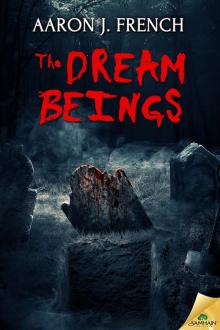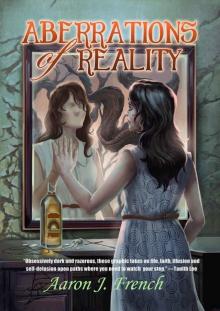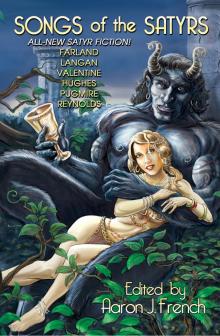- Home
- Aaron J. French
Songs_of_the_Satyrs Page 9
Songs_of_the_Satyrs Read online
Page 9
He lay on the ground, crying out. He heard the horses slow and stop. The hunters were dismounting. Smelling water, he managed to raise himself. He got unsteadily to his feet and tottered forward.
Then he remembered the lake.
He could not swim, but death was preferable to capture. Varinius stumbled to the brink of a cliff that dropped some forty feet to an expanse of deep, clear water. He felt blood in his mouth. His insides seemed to be on fire. He heard voices and the sound of feet snapping dead branches. He flung himself forward, stumbling over the edge and plunging down to the water below.
***
He reached for another bottle of brandy. Sixteen forty, he thought—the year the Civil War began and the year troopers loyal to Cromwell shot him. Lorena had saved his life. That incident, he reflected bitterly, had won him lasting fame.
He smiled as he drank down a quantity of Hennessy.
The poet Marvell had been in the hunting party. A poem he wrote, “The Nymph Complaining for the Death of her Faun,” came out of the incident. It pained him. Whenever Varinius read it, he thought of Lorena.
On that day so long ago, he had fallen, hit the water, thrashed and struggled, and then gone under. As his consciousness failed, he felt hands seize and pull him. He thought his pursuers had dived in to capture him, but when he woke up he found himself in a dry cave. Beside him squatted a woman with light blue skin and long blue tresses.
Varinius tried to get up. The woman reached out and touched him.
“Don’t move. You are still healing. They hit you with one of their bolts. You will heal but you are not yet well enough to stand or walk.”
He groaned, feeling relief but immense weariness.
“The blessing of Almighty Zeus rest on / Your soul and on your body, goddess fair,” he said, lapsing into the poetic meter he used to address female deities. “The Lord of Thunder will repay your grace.”
She smiled, bent down, and kissed his lips.
“Soft,” she replied. “Sleep and heal.”
She gave him drugged wine. He lapsed into blackness.
***
As Varinius finished off the brandy, he reflected on human women. They did come in an assortment of shades and hues. England was a nation with many seaports, so people of many lands came here. He had slept with women who had golden skin and almond eyes, skin the color of ebony, white and freckled women, and women from India with beautiful brown bodies. Their beauties, though, were nothing compared to the blue of a Naiad’s skin or the soft green of dryads when they left their existence as trees and took on flesh.
Lorena had nursed him back to health. He still sighed at the memory of her beauty. Being a water woman, she wore nothing. She had small but perfectly formed breasts, a slender muscular body, beautiful hips, a lovely cunt, and webbed toes and fingers. When he asked her if she had a lover, her eyes grew very sad.
“I consorted with Priscus for many years,” she’d said. “He left when a priest consecrated the ground in his grove to build a church. For a few years, Thalia was my lover. She was the genius of a pond that joined my lake by a small stream. The local farmers dammed the stream and drained her pond to make a grain field. She died.”
“I’m sorry.”
“She was a sweet lover. So was Priscus. But Zeus has sent you to me.”
He healed. Lorena became his lover. The main entrance to her cave lay under the water, but a long, cramped tunnel led out to a grove near the lake. There he stumbled on the treasure.
***
The brandy had enflamed Varinius.
Lust. He crept back into his bedroom. He slipped under the covers and put his hand on the voluptuous, snoring woman. She came awake as he greedily kissed her breasts and then her lips and nose.
“You want it again already?” she groaned sleepily.
By now he could only grunt.
“Get some lotion,” she said. “You’ve dried me out. You never stop, Morlington.”
The bedroom, pitch black and shuttered, painted a dark color, concealed his goat legs, tail, and hooves (he kept his horns cut short). He found a bottle of camphor-scented cream, spread it on her mound and slit, and quenched his wine-flamed lust.
Lucy Grandville moaned, bucked, and squealed as the two of them went at it. She had fought (or, he smiled, fucked) her way to the status of most sought-after whore in London. He had paid a huge sum to bring her and two of her girls here for a long weekend. Of course money was no obstacle to him. He had money enough to last to the end of time.
***
After healing from the wound, Varinius cautiously explored the grove near Lorena’s lake. Hunters had torn it up, rutting through it with horses and dogs, searching for him. As he learned to speak their language (a thing Lorena insisted he do), he stealthily listened in on conversations around campfires and among farmers and herdsmen. A satyr, they said, had been spotted in the groves not far from Otter Bay Lake. Sportsmen from all over England were coming north to hunt him.
The presence of the quarry men had frightened away the animals and birds; the droppings of the horses and dogs had fouled the soil and fertilized the weeds; and, of course, the parties of humans who wanted to kill him had ravaged the groves, dells, and meadows where he had lived for hundreds of years.
He found a new woodland in a remote location a few miles from Lorena’s lake. Rumor said it was haunted. An association with ancient druidical worship made locals avoid it. An old law dating back to the time of King Henry III forbade hunting there. It seemed a safe place for him to dwell.
He noticed, as he grew more familiar with the area, an oddly shaped mound. It protruded from the ground in a circle of massive boulders covered with moss and the soil from years of leaves and grass breaking down and returning to humus. Something suggested it was not a natural formation. He dug through a gap between two of the mound’s massive stones. Dirt crumbled. He felt resistance and pushed. Something gave way, and Varinius fell forward. Soil and stone rained down on him as he stumbled and rolled, shielding his head. Silence returned. The dust settled. He twisted his body around. His eyes grew wide at what he saw.
Treasure filled the chamber from top to bottom: piles of gold and silver bars, vessels set with precious stones, and containers of fine jewels. It was a fortune for a king. It would eventually enable him to live convincingly as a human being.
***
He heard Lucy groan and felt her buckle beneath him. He smiled with satisfaction. Who else, he mused, could make the top whore in Britain come? He felt a surge of passion, gripped her, and drove into her with unbridled intensity. A long, loud moan of pain and ecstasy broke from her throat as he finished. When silence came, she lightly struck his back with her fists.
“Off,” she said. “You’re wearing me out. No more for a while. Annabella and Cynthia are here. Ride those young colts if you want it again. I need to rest.”
He kissed her and said he would let her rest. He got up, washed, and dressed. The governor of the shire would be coming by today. He planned on entertaining him royally—with pomp, a banquet, and with Annabella and Cynthia. Lucy, he had decided, would be reserved for himself.
***
What he found in the cave had facilitated his successful sojourn among the human mortals. But Lorena had not fared so well.
One day she seemed troubled. He asked her what was wrong.
“The humans are building some sort of structure on the edge of my lake,” she said.
Varinius did not think this was something she should be so troubled about—two or three cottages where families could live nestled on the shore of her lake. She lived underwater or in her cave. No one would see her.
But her instinct had been right. A local entrepreneur had built a cooperage there. To bend the wood for the barrels they made, they used lye. They dumped the residue from the operation into the lake.
The fish and turtles died. Birds and deer no longer came there to nest and drink. The waters, though a beautiful deep blue, became poisonous
and dead. In only a matter of months, the toxins took Lorena as well. He remembered the stages of her demise. She grew thin. Her eyes became dull. Lethargic and nauseous, she moped about her cave.
Varinius said she should find another dwelling place, but by the time he said this Lorena was too ill to travel. She collapsed one day. He carried her thin, feverish body to a grove, hoping sunshine and fresh air might purge the destroying vapors within her. She only grew more miserable and ill. He laid her under an oak. She vomited black fluid, trembled, wept, and died convulsing and screaming in pain.
Varinius buried her by the oak. As he turned, a woman, a hamadryad, materialized by the side of her grave.
She wore a white chiton dress. Her brown hair gathered on one side, she radiated beauty and dignity.
“You are the spirit who dwells in this tree?” he asked.
She nodded.
“I’m sorry I placed a corpse so near to your habitation. I will rebury her.”
“You don’t need to do that. The poor thing has suffered enough without having her grave disturbed.” She paused and then said, “I am Ionia.”
“Varinius. I would not have dug here if I’d known. I did not sense your presence.”
“I don’t exist as a tree enough that my presence resonates here much anymore. I’ve managed to find a place among the humans. You might think about doing the same yourself, Varinius.”
He looked at her. The wind blew and fluttered her garment.
“Easier for you than for me,” he replied.
“It will be more complicated for you than it was for me, yes. Still, I do not jest.” She looked at the pile of freshly turned earth where he had buried Lorena. “They caused her death. They will eventually cause your death. I have taken steps to make sure they don’t destroy me. In a short while, I will own this land. That way I can make certain this tree is never cut down. Your form is a challenge, certainly. But you have found the hoard the Roman Britons hid in the ground during the days of Boudicca. Money will enable you. You can make a place for yourself in their world as I have made a place for myself.”
“You know about the treasure?”
“I know this land. Some of my roots go into the cave. I don’t need any of the gold there.”
He did not know what to say. She smiled.
“Come to the house four stadia down this road.” She pointed. “I dwell there. Establish your presence. It will be your entry to the human world.”
“How?”
“Disguise yourself. Use your resources. At one time satyrs had the reputation of being wily.”
And with that she vanished.
***
Varinius came down to breakfast. Biggs, his valet, brought him tea and the London paper. He sat in a chair, taking in the sunlight, feeling the cool breeze blow through the open windows, satisfied to his marrow by a night of love with Lucy.
He ran his eyes over the paper. The population of the United States had reached fifty million. The Bolivian army had been routed by the Chileans in the Pacific War, and the Chileans had captured Lima. The Empire, still reeling from the heavy losses and Maiwand, felt better now that an expeditionary force had relieved the garrison at Kandahar and were in pursuit of the Afghan rebels—who, it seemed, had suffered serious, crippling losses in the battle, making it a pyrrhic victory.
He sighed. In the past, he had had no interest in human affairs. He had lived his life in nature, in the immediate experience, not qualified by the passing of time.
Biggs brought in his breakfast of bacon, eggs, rolls, and butter. He topped the meal off with a frothing mug of ale. He felt refreshed. He also thought of Annabella and Cynthia. Since they would be the main attractions after the banquet, perhaps it would be good if he broke them in a bit. He laughed out loud. Like they needed breaking in.
As he ate, he remembered the visit to Ionia and his first time inside a human dwelling.
***
He stole clothes drying on a line. Putting them on, he shuddered. The confinement seemed unbearable—yet he knew the humans hardly ever went unclothed.
The shirt and waistcoat fit well. The trousers were a problem. His crooked goat legs did not fit easily into them. He found a pair of boots cast off in a trash heap—though they looked new and sound to him. But his hooves slid about on the soles, so he stuffed them with moss and leaves and practiced walking in them before he set out for the house Ionia said he should visit.
It loomed up before him when he turned a corner. Its towers and gables pierced the sky. A brick fence topped with iron spikes bounded it. He came to the iron gate. A servant in a powdered wig met him there.
“And whom shall I say is calling?”
He realized he had to invent a name.
“Tell her Mr. Morlington is here at the invitation of Miss Ionia.”
When he heard this, he instantly became obsequious, bowing and opening the gate. Still wobbling a little in his boots, Varinius followed the man down the long lane leading to the house.
Another servant appeared at the door. The two men whispered and the gatekeeper left. The house servant showed Varinius inside.
He found himself in a large room filled with furniture made of white and light brown wood with gold trim. Thick red cloth covered the floor. Dazzling glass ornaments hung from the ceiling. He heard footfalls. Ionia appeared on the other side of the chamber.
She had on garments that the humans wore—though in the course of his interactions with humans he had encountered mostly men, hardly any women. She was wearing a gown with a full, billowing skirt. The garment gathered at her waist, making her middle appear unnaturally thin. The top of it, cut low, revealed a wide swath of her beautiful white breasts. His blood stirred at the sight of them.
“Lady Mannering will be along shortly,” she whispered. “She has left all of her property and wealth to me. In a short while you will understand why.”
At that very moment, he heard a voice lilt: “O pussy! Pussy cat, are you here?”
That night Ionia met him beneath the moonlight by her oak. She slipped out of her chiton, he threw his arms around her, and they mingled in love under the sight of the chaste moon. After the rolling, grunting, and gasping was over, they sat on a mossy rock and watched the white light Phoebe shed play across the clear water of a rocky stream that ran near the oak tree where Ionia’s spirit rested.
“I felt so bad for Lorena,” she said. “I want to make sure the same thing does not happen to me. No one will ever cut down this oak because I will soon own it.”
“How long have you been Lady Mannering’s lover?”
“Four years. She is dying. I can tell, but she can’t. Cancer is growing in her. She will soon sicken and perish. She thinks the weariness she feels is the infirmity of age. When she is gone, I will become sole owner of her estate.”
He glanced at her beautiful, gentle body, white like ivory in the bath of moonlight. When a breeze arose and blew her hair, his blood jumped.
“You need to make provision for yourself,” she said. “The men of the district talk of seeing a satyr and scour the land you once counted as your realm, hunting you. You will not be safe as long as you’re living in the wild.”
She paused.
“I don’t want you to die, Varinius. I want you to live. I want you to be near me, to be a lover and friend. I am ripe to have a child. This only happens every two hundred years or so. I want you to father my child. But with us, it takes a lot of effort. I need you around for a long while. If you stay out in the wilderness, even in the sacred land, they will eventually find you and kill you.”
He saw the truth of her words. They listened to the plashing of the stream for a long time.
“I endure that woman’s embrace,” she said, “only to preserve myself. You too must make your place in the human world.”
“I would not even know where to begin.”
“I have an idea,” she said.
***
Varinius finished his breakfast. He decided he w
ould ride over and see Ionia. Their child, Nerina, had found land of her own and married one of the local deities who had also managed to survive disguised as a human. They lived in Ely (her husband was a genius of the marshes there). He could visit Ionia, roll with her, and then return and prepare Annabella and Cynthia for the considerable business they would do tonight.
His servants got his horse ready. He still found riding awkward. Ionia insisted he learn, and he was glad he did. Still, sitting astride a fellow beast felt unnatural. His settlement in the human world, he recalled, began with riding a horse to Paige House, the manor he would eventually acquire.
***
He had learned about Lord Paige from Lady Mannering.
Two months before her abrupt death from cancer, he had sat with her and Ionia at tea. He noticed how her hand shook as she raised her teacup to her lips. It clattered when she set it down.
“Pussy tells me you are looking for property.”
“I am,” he said. “I own houses in London and in Hull, but my love is for the country.”
“Lord Paige is selling his estate. He’s flat broke, I’m told—drinking, gambling, profligacy. You could probably get it for a song.” She smiled. “He even owns the satyr’s grove. No one has caught the creature yet, but we are told he still lurks in the precincts.”
He rode over to the Paige House. The structure, ancient, slightly medieval in its look, sat on a hill. Huge oaks surrounded it. The grounds, he noticed, had sunk to deplorable condition. Weeds choked the lawns. Grass grew through the flagstones leading to the front door. Scraggly vines crawled over the fences. He saw a pack of skinny dogs—probably hunting hounds gone feral—nosing for food in the weedy garden. No servants greeted him. He went up to the door and rang the bell.
After a long time, the door opened.

 The Dream Beings
The Dream Beings The Demons of King Solomon
The Demons of King Solomon Aberrations of Reality
Aberrations of Reality The Time Eater
The Time Eater Songs_of_the_Satyrs
Songs_of_the_Satyrs